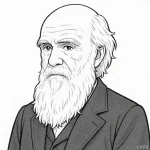“Man is the only animal capable of reasoning, though many others possess the faculty of memory and instruction in common with him.”

- 384 BC – 322 BC
- Originating from Macedonia in ancient Greece
- Philosopher and scientist, founder of the Lyceum academy
table of contents
Quote
“Man is the only animal capable of reasoning, though many others possess the faculty of memory and instruction in common with him.”
Explanation
In this quote, Aristotle highlights the unique ability of humans to reason—that is, to engage in abstract thought, logic, and problem-solving. While many animals share certain cognitive abilities, such as memory and the ability to be trained or instructed, they do not possess the capacity for reasoning in the same way humans do. Memory allows animals to recall past experiences, and instruction enables them to learn behaviors, but reasoning allows humans to reflect, analyze, and make decisions based on complex concepts and principles. Reasoning is the foundation of human philosophy, science, and ethics, setting us apart from other animals.
This distinction remains relevant in today’s world, especially in discussions about artificial intelligence and cognitive science. While computers and animals can perform tasks based on memory and learned instructions, human reasoning goes beyond simple responses to stimuli, involving critical thinking, ethics, and the ability to make informed choices in complex situations. For example, humans are capable of abstract reasoning about concepts like justice, morality, or the future, which animals, even with advanced cognitive abilities, do not do in the same way.
Aristotle’s quote also suggests that reasoning is central to what it means to be human and is a key element of our ability to build societies, create technology, and make philosophical or ethical decisions. It underscores the importance of cultivating and developing our reasoning abilities, as they are central not only to our individual development but to our ability to make meaningful contributions to the world.
Would you like to share your impressions or related stories about this quote in the comments section?



